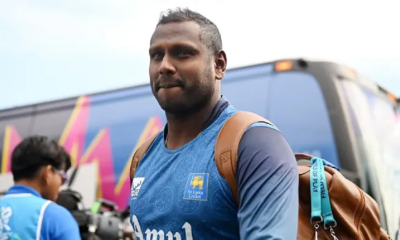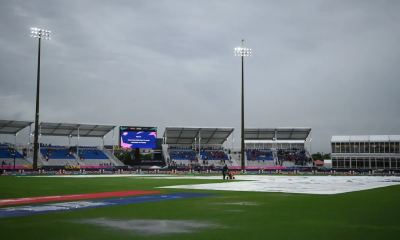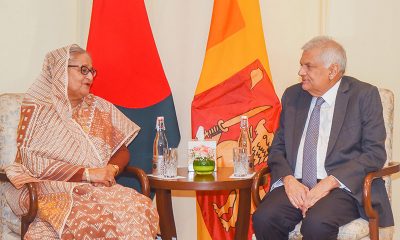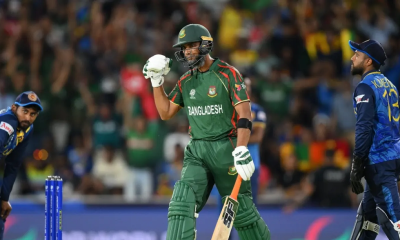Opinion
Moving from #GotaGoHome to #SystemChange

By Kaushalya Perera
 #GotaGoHome captures a diverse range of demands. One of these is the demand for ‘kramaya peralamu’ or systemic change. If the emotional fallouts, resulting from the appointment of the new Prime Minister show us anything, it is that the struggle for long-term change in Sri Lanka’s socio-political structures will take longer and be much harder than finding ways to deal with the economic crisis upon us now.
#GotaGoHome captures a diverse range of demands. One of these is the demand for ‘kramaya peralamu’ or systemic change. If the emotional fallouts, resulting from the appointment of the new Prime Minister show us anything, it is that the struggle for long-term change in Sri Lanka’s socio-political structures will take longer and be much harder than finding ways to deal with the economic crisis upon us now.
Today, I focus on the systemic changes necessary in education. The role of education in building a livable country should be self-evident. It is telling, for instance, that during this time, we citizens have had to educate ourselves on the fundamentals. What is the demarcation between state, government and politicians’ whims? Why did companies accept a tax rebate, knowing it would damage the country’s economy so much? Can a president resign and what happens then? How does one act in a peaceful protest? What happened in Sri Lanka in 1953? And so on.
Why were we caught unawares? One would imagine that the role of education is to teach us to apply what is learnt in class to what happens around us. To reflect on our own actions. To speak up when necessary. It should allow us to examine our values and understand when individual interests and actions are harmful to society. Yet we obviously don’t have such an education system, because education itself has been in crisis for decades. How can we create mindful citizens when the very foundation of education has disintegrated?
Here’s a brief overview of the current problems in education:
Multiple ‘systems’ of education co-exist uncomfortably in the country. Pre-schools are unregulated; pre-school teachers are paid a pittance. National, provincial and private schools work under different regulations while international schools operate as companies or charities. Tertiary education is provided via technical colleges, state universities, private higher education institutions, etc.
School teachers are recruited under multiple sets of criteria to the state (national and provincial), private and international schools. Novice teachers in the state system receive approximately Rs 40,000. One might expect teachers, in private or international schools, to be paid more but this, is rarely the case. A majority of the country’s teachers (whatever the sector) learn on the job, or if they receive training before being appointed, they probably won’t receive any opportunities for in-service training.
School syllabi are similarly defective. National school syllabi are usually boring, at times outdated, and do little to counter the sexism and racism at large in our society. Foreign syllabi used in international schools may not have the same problems but are unsuitable in that they cater to life outside rather than within Sri Lanka. Tertiary education is also problematic as we regularly discuss in this column.
The state has convinced its citizens to spend their private monies on education and has thereby divested itself of the responsibility to educate its own people. The low teacher salaries in state schools is one example of neglect. Here’s another – the monies set aside for ‘welfare’ in the budget estimate of 2022 (presented last year): Rs 2,445,500,000 was allocated for welfare in Defence, as opposed to Rs 1,825,000,000 for welfare in Education and Rs 2,000,000,000 for welfare in Health. This might explain for instance, why the school meal programme—crucial in alleviating malnutrition in school-going children—was funded through a foreign grant rather than state funds (and still does not explain why the programme stopped during the Covid-19 period). Meagre state funding for education means that citizens spend their own money for education-related expenses, including transport and stationery, continuous ‘donations’, events, private tuition, cooking meals, cleaning the schools, etc.
The Aragalaya—as we have come to call it—is a time of hope for many. Yet sustained work is necessary within the institutions where we work, if we are to take this struggle beyond this specific time and place.
Politicisation, corruption and cronyism have seeped into all our institutions, including the UGC and the universities, and if this is not glaringly obvious, it is because such practices have become normalised. We have seen little critique, or resistance, against politically-backed appointments in universities over the past two decades, for example. The principle of conflict of interest is sometimes forgotten by academics. Unquestioning compliance is an illustration of our own apathy in the state higher education sector. Change is too much trouble.
The impact of a system decaying from within is slow to be felt and therefore, it will be difficult to achieve significant change in our education system. We have seen evidence of this already. Teachers’ unions have not been able to change the decline of the education sector and sustained FUTA campaigns to ‘save free education’ has not led to democratised universities.
The current crisis has shown us that successive governments have neglected the education of its citizens. We have not learnt to be citizens. With their inefficiency, corruption and callousness, our governments have shown us that we can only rely on our own networks to ‘get things done’. The ability to see these as things that need to change—to feel the need to speak up and speak out about these issues, to resist in lawful ways—are all part of educating ourselves.
When we ask for policy change, let us ask for policies that are radically different to those we have now. Currently, education is a place where we build skills that will help us compete with each other, rather than build communities. The number of qualifications we acquire is more important than how we learn or the quality of our learning. By changing these things, we can demand an education that makes us more aware of country and community; one that helps us navigate our moral and ethical quandaries as well as our economic and political ones. And to do this, we need to change our own stance towards education and move away from the individualistic, competitive ethos that has overtaken us today.
If we want an educational environment that would deliver radical change, we must begin by asking for teachers who want to teach, whether in a Montessori, primary school or university. This also means demanding that school teachers are paid a higher salary and that they receive the training they need to be inspiring and committed educators. We must also ask that our curricula be changed. None of this will happen unless the state sets aside the required resources for education and creates informed policies.
These demands may seem idealistic. How can a country in crisis, with no money for fuel or food, demand funding for education? Yet a few months ago, we would have thought that a protest in front of the President’s residence, in Mirihana, was impossible. Political scientists, language teachers, science teachers, economists and historians all have work to do. As Black feminist author bell hooks says the classroom is the ‘most radical place of possibility’. #GotaGoHome is a metaphor for a larger call for ‘system change’. I ask that we begin to imagine this change and work towards it. We can imagine more.
(Kaushalya Perera teaches at the Department of English, University of Colombo)
Kuppi is a politics and pedagogy happening on the margins of the lecture hall that parodies, subverts, and simultaneously reaffirms social hierarchies.
Opinion
A wise Christmas

Important events in the Christian calendar are to be regurlarly reviewed if they are to impact on the lives of people and communities. This is certainly true of Christmas.
Community integrity
Years ago a modest rural community did exactly this, urging a pre-Christmas probe of the events around Jesus’ birth. From the outset, the wisemen aroused curiosity. Who were these visitors? Were they Jews? No. were they Christians? Of course not. As they probed the text, the representative character of those around the baby, became starkly clear. Apart from family, the local shepherds and the stabled animals, the only others present that first Christmas, were sages from distant religious cultures.
With time, the celebration of Christmas saw a sharp reversal. The church claimed exclusive ownership of an inclusive gift and deftly excluded ‘outsiders’ from full participation.
But the Biblical version of the ‘wise outsiders’ remained. It affirmed that the birth of Jesus inspired the wise to initiate a meeting space for diverse religious cultures, notwithstanding the long and ardous journey such initiatives entail. Far from exclusion, Jesus’ birth narratives, announced the real presence of the ‘outsider’ when the ‘Word became Flesh’.
The wise recognise the gift of life as an invitation to integrate sincere explanations of life; true religion. Religion gone bad, stalls these values and distorts history.
There is more to the visit of these sages.
Empire- When Jesus was born, Palestine was forcefully occcupied by the Roman empire. Then as now, empire did not take kindly to other persons or forces that promised dignity and well being. So, when rumours of a coming Kingdom of truth, justice and peace, associated with the new born baby reached the local empire agent, a self appointed king; he had to deliver. Information on the wherabouts of the baby would be diplomatically gleaned from the visiting sages.
But the sages did not only read the stars. They also read the signs of the times. Unlike the local religious authorities who cultivated dubious relations with a brutal regime hated by the people, the wise outsiders by-pass the waiting king.
The boycott of empire; refusal to co-operate with those who take what it wills, eliminate those it dislikes and dare those bullied to retaliate, is characteristic of the wise.
Gifts of the earth
A largely unanswered question has to do with the gifts offered by the wise. What happened to these gifts of the earth? Silent records allow context and reason to speak.
News of impending threats to the most vulnerable in the family received the urgent attention of his anxious parent-carers. Then as it is now, chances of survival under oppressive regimes, lay beyond borders. As if by anticipation, resources for the journey for asylum in neighbouring Egypt, had been provided by the wise. The parent-carers quietly out smart empire and save the saviour to be.
Wise carers consider the gifts of the earth as resources for life; its protection and nourishment. But, when plundered and hoarded, resources for all, become ‘wealth’ for a few; a condition that attempts to own the seas and the stars.
Wise choices
A wise christmas requires that the sages be brought into the centre of the discourse. This is how it was meant to be. These visitors did not turn up by chance. They were sent by the wisdom of the ages to highlight wise choices.
At the centre, the sages facilitate a preview of the prophetic wisdom of the man the baby becomes.The choice to appropriate this prophetic wisdom has ever since summed up Christmas for those unable to remain neutral when neighbour and nature are violated.
Wise carers
The wisdom of the sages also throws light on the life of our nation, hard pressed by the dual crises of debt repayment and post cyclonic reconstruction. In such unrelenting circumstances, those in civil governance take on an additional role as national carers.
The most humane priority of the national carer is to ensure the protection and dignity of the most vulnerable among us, immersed in crisis before the crises. Better opportunities, monitored and sustained through conversations are to gradually enhance the humanity of these equal citizens.
Nations in economic crises are nevertheless compelled to turn to global organisations like the IMF for direction and reconstruction. Since most who have been there, seldom stand on their own feet, wise national carers may not approach the negotiating table, uncritically. The suspicion, that such organisations eventually ‘grow’ ailing nations into feeder forces for empire economics, is not unfounded.
The recent cyclone gave us a nasty taste of these realities. Repeatedly declared a natural disaster, this is not the whole truth. Empire economics which indiscriminately vandalise our earth, had already set the stage for the ravage of our land and the loss of loved ones and possessions. As always, those affected first and most, were the least among us.
Unless we learn to manouvre our dealings for recovery wisely; mindful of our responsibilities by those relegated to the margins as well as the relentles violence and greed of empire, we are likely to end up drafted collaborators of the relentless havoc against neighbour and nature.
If on the other hand the recent and previous disasters are properly assessed by competent persons, reconstruction will be seen as yet another opportunity for stabilising content and integrated life styles for all Lankans, in some harmony with what is left of our dangerously threatened eco-system. We might then even stand up to empire and its wily agents, present everywhere. Who knows?
With peace and blessings to all!
Bishop Duleep de Chickera
Opinion
Ranwala crash: Govt. lays bare its true face
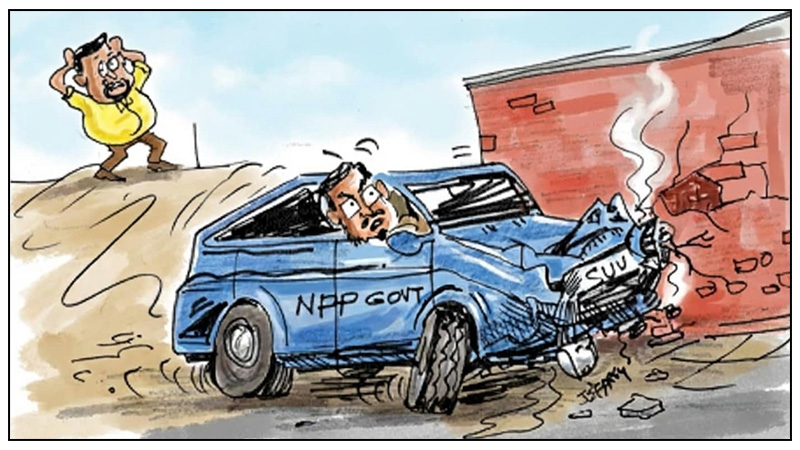
The NPP government is apparently sinking into a pit dug by the one of its members, ‘Dr’ Asoka Ranwala; perhaps a golden pit (Ran Wala) staying true to his name! Some may accuse me of being unpatriotic by criticising a government facing the uphill task of rebuilding the country after an unprecedented catastrophe. Whilst respecting their sentiment, I cannot help but point out that it is the totally unwarranted actions of the government that is earning much warranted criticism, as well stated in the editorial “Smell of Power” (The Island, 15 December). Cartoonist Jeffrey, in his brilliance, has gone a step further by depicting Asoka Ranwala as a giant tsunami wave rushing to engulf the tiny NPP house in the shore, AKD is trying to protect. (The Island, 18 December).
The fact that Asoka Ranwala is very important to the JVP, for whatever reason, became evident when he was elected the Speaker of Parliament despite his lack of any parliamentary experience. When questions were raised about his doctorate in Parliament, Ranwala fiercely defended his position, ably supported by fellow MPs. When the Opposition kept on piling pressure, producing evidence to the contrary, Ranwala stepped aside, claiming that he had misplaced the certificate but would stage a comeback, once found. A year has passed and he is yet to procure a copy of the certificate, or even a confirmatory letter from the Japanese university!
The fact that AKD did not ask Ranwala to give up his parliamentary seat, a decision he may well be regretting now following recent events, shows that either AKD is not a strong leader who can be trusted to translate his words to action or that Ranwala is too important to be got rid of. In fact, AKD should have put his foot down, as it was revealed that Ranwala was a hypocrite, even if not a liar. Ranwala led the campaign to dismantle the private medical school set up by Dr Neville Fernando, which was earning foreign exchange for the country by recruiting foreign students, in addition to saving the outflow of funds for educating Sri Lankan medical graduates abroad. He headed the organisation of parents of state medical students, claiming that they would be adversely affected, and some of the photographs of the protests he led refer to him as Professor Ranwala! Whilst leading the battle against private medical education, Ranwala claims to have obtained his PhD from a private university in Japan. Is this not the height of hypocrisy?
The recent road traffic accident he was involved in would have been inconsequential had Ranwala been decent enough to leave his parliamentary seat or, at least, being humble enough to offer an apology for his exaggerated academic qualifications. After all, he is not the only person to have been caught in the act of embellishing a CV. As far as the road traffic accident is concerned, too, it may not be his entire responsibility. Considering the chaotic traffic, in and around Colombo, coupled with awful driving standards dictated by lack of patience and consideration, it is a surprise that more accidents do not happen in Sri Lanka. Following the accident, may be to exonerate from the first count, a campaign was launched by NPP supporters stating that a man should be judged on his achievements, not qualifications, further implying that he does not have the certificate because he got it in a different name!
What went wrong was not the accident, but the way it was handled. Onlookers claim that Ranwala was smelling of alcohol but there is no proof yet. He could have admitted it even if he had taken any alcohol, which many do and continue to drive in Sri Lanka. After all, the Secretary to the Ministry overseeing the Police was able to get the charge dropped after causing multiple accidents while driving under the influence of liquor! He, with another former police officer, sensing the way the wind was blowing formed a retired police collective to support the NPP and were adequately rewarded by being given top jobs, despite a cloud hanging over them of neglect of duty during the Easter Sunday attacks. This naïve political act brought the integrity of the police into question. The way the police behaved after Ranwala’s accident confirmed the fears in the minds of right-thinking Sri Lankans.
In the euphoria of the success of a party promising a new dawn, unfortunately, many political commentators kept silent but it is becoming pretty obvious that most are awaking to the reality of a false dawn. It could not have come at a worse time for the NPP: in spite of the initial failures to act on the warnings regarding the devastating effects of Ditwah, the government was making good progress in sorting problems out, when Ranwala met with an accident.
The excuses given by the police for not doing a breathalyser test, or blood alcohol levels, promptly, are simply pathetic. Half-life of alcohol is around 4-5 hours and unless Ranwala was dead drunk, it is extremely unlikely any significant amounts of alcohol would be detected in a blood sample taken after 24 hours. Maybe the knowledge of this that made government Spokesmen to claim boldly that proper action would be taken irrespective of the position held. Now that the Government Analyst has not found any alcohol in the blood, no action is needed! Instead, the government seems to have got the IGP to investigate the police. Would any police officers suffer for doing a favour to the government? That is the million-dollar question!
Unfortunately, all this woke up a sleeping giant; a problem that the government hoped would be solved by the passage of time. If the government is hoping that the dishonesty of one of its prominent members would be forgotten with the passage of time, it will be in for a rude shock. When questioned by journalists repeated, the Cabinet spokesman had to say action would be taken if the claim of the doctorate was false. However, he added that the party has not decided what that action would be! What about the promise to rid Parliament of crooks?
It is now clear that the NPP government is not any different from the predecessors and that Sri Lankan voters are forced to contend with yet another false dawn!
by Dr Upul Wijayawardhana ✍️
Opinion
Ceylon pot tea: redefining value, sustainability and future of global tea

The international tea industry is experiencing one of the most difficult periods in its history. Producers worldwide are caught in a paradox: tea must be made “cheaper than water” to stay competitive, yet this very race to the bottom erodes profitability, weakens supply chains, and drives away the most talented professionals whose expertise is essential for innovation. At the heart of this crisis lies the structure of commodity tea pricing. Although the auction system has served the world for over a century, it has clear limitations. It rewards volume rather than innovation, penalises differentiation, and leaves little room for value-added product development.
Sri Lanka, one of the world’s finest tea origins, feels this pressure more intensely than most. The industry’s traditional reliance on auctions prevents it from accessing the full premium that its authentic climate, terroir, and craftsmanship deserve. The solution is not to dismantle auctions—because they maintain transparency and global trust—but to evolve beyond them. For tea to thrive again, Ceylon Tea must enter the product market, where brand value, wellness benefits, and consumer experience define price—not weight.
Sri Lanka’s Unique Comparative Advantage
Sri Lanka possesses both competitive and comparative advantage unmatched by any other tea-producing nation. One of the least-discussed scientific advantages is its low gravitational pull, enabling the tea plant to circulate nutrients differently and produce a uniquely delicate, flavour-rich leaf. This natural phenomenon, combined with diverse microclimates, gives Sri Lankan tea extraordinary antioxidant density, rich polyphenols, and a full sensory profile representative of the land and its people.
However, this advantage is undermined by weaknesses in basic agronomy. Most estates do not use soil augers, and soil sampling is often inconsistent or unscientific. This leads to overuse of artificial fertilizer, underinvestment in regenerative practices, and weak soil organic matter (SOM). Without scientific soil management, even a world-class tea origin can lose its competitive edge. Encouragingly, discussions are already underway with the Assistant Indian High Commissioner in Kandy to explore sourcing 3,000 scientifically engineered soil augers for Sri Lanka’s perennial agriculture sector—a transformative step toward soil intelligence and sustainable input management.
Improving SOM, moderating fertilizer misuse, and systematically diagnosing soil nutrient deficiencies represent true sustainability—not cosmetic commitments. Plantation agriculture, which supports over one million Sri Lankan livelihoods, depends on this shift.
The Real Economic Challenge: Price per Kilogram
The most urgent sustainability problem is not climate change or labour cost—it is the low price per kilogram Sri Lanka receives for its tea. Nearly 20% of the tea leaf becomes “refuse tea”, a stigmatized fraction that still contains antioxidants and valuable nutrients but fetches a low price at auctions. The system inherently undervalues almost a fifth of the raw material.
A rational solution is to market the entire tea leaf without discrimination, transforming every component—tender leaf, mature leaf, fiber, and fines—into a premium product with a minimum retail value of USD 15 per kilogram. Achieving this requires product innovation, not further cost reduction.
Ceylon Pot Tea: A Transformative Opportunity
Ceylon Pot Tea emerges as a comprehensive solution capable of addressing long-standing structural issues in Sri Lanka’s tea industry. Unlike traditional tea grades, Pot Tea compresses the entire fired dhool into a high-value cube, similar to the global success of soup cubes. Every part of the leaf is represented, unlocking maximum biochemical utilisation and offering consumers a fuller taste profile with richer aroma, deeper colour, and higher antioxidant content.
Pot Tea is perfectly aligned with the health and wellness market, one of the fastest-growing global consumer segments. As an Herbal Medicinal Beverage (HMB), it captures the complete phytonutritional matrix of the tea leaf, including polyphenols, catechins, and climate-influenced compounds unique to Ceylon. The product also offers storytelling power: every cube reflects the terroir, the gentle fingers that plucked the leaf, and the mystical nature of tea grown in a land with unusually low gravitational intensity.
Already, international partners—particularly in Russia—and domestic innovators have expressed enthusiasm. Pot Tea aligns closely with the policy direction set by the Hon. Samantha Vidyarathne and the NPP Government, especially the national goal of achieving 400 million Kgs of national annual production per year by unlocking new value chains and premium product categories.
Why Immediate Government Intervention Is Necessary
For Sri Lanka to fully benefit from Ceylon Pot Tea and other modernized value chains, the government must urgently introduce:
1. Minimum Yield Benchmarks per hectare (3-year targets) for all perennial crops, informed by scientific investment appraisals.
2. A classification shift from “plantations” to land-based investment enterprises, recognising the capital-intensive, long-term nature of tea cultivation.
3. Incentives for soil testing, soil auger adoption, and SOM improvement programs.
4. Support for value-added tea manufacturing and export diversification.
These steps would create an enabling environment for Pot Tea to scale rapidly and position Sri Lanka as the world’s leading innovator in tea-based wellness products.
Way Forward: Positioning Ceylon Pot Tea for Global Leadership
The path ahead requires a coordinated national and industry-level effort. Sri Lanka must shift from simply producing tea to designing tea experiences. Ceylon Pot Tea can lead this transformation if:
1. Branding and Certification Are Strengthened
CCT (Ceylon Certified Tea) standards must be universally adopted to guarantee purity, origin authenticity, and ethical production practices.
2. Research, Soil Science & Agronomy Are Modernized
With scientific soil audits, optimized fertigation, and regenerative agriculture, Sri Lanka can unlock higher yields and stronger biochemical profiles in its leaf.
3. A Global Wellness Narrative Is Created
Position Pot Tea as a nutritional, therapeutic, anti-aging, and calming beverage suited for the modern lifestyle.
4. Export Market Activation Begins Immediately
Pilot shipments, influencer partnerships, and cross-border digital campaigns should begin with Russia, the Middle East, Japan, and premium EU markets.
5. Producers Are Incentivised to Convert Dhools to Cubes
This ensures minimal waste, improved margins, and equitable value distribution across the supply chain.
Conclusion: A New Dawn for Ceylon Tea
Ceylon Pot Tea offers Sri Lanka a rare chance to pivot from a commodity-driven past to a premium, wellness-oriented, high-margin future. It aligns economic sustainability with environmental responsibility. It empowers estate communities with modern agronomy. And most importantly, it transforms every gram of the tea leaf into value—finally rewarding the land, the planter, and the plucker.
If implemented with vision and urgency, Ceylon Pot Tea will not only revitalise an industry under immense pressure but also secure Sri Lanka’s place as the world’s most innovative and scientifically grounded tea nation.
By. Dammike Kobbekaduwe
(www.vivonta.lk & www.planters.lk) ✍️
-

 News1 day ago
News1 day agoMembers of Lankan Community in Washington D.C. donates to ‘Rebuilding Sri Lanka’ Flood Relief Fund
-

 News6 days ago
News6 days agoPope fires broadside: ‘The Holy See won’t be a silent bystander to the grave disparities, injustices, and fundamental human rights violations’
-

 News6 days ago
News6 days agoPakistan hands over 200 tonnes of humanitarian aid to Lanka
-

 Business5 days ago
Business5 days agoUnlocking Sri Lanka’s hidden wealth: A $2 billion mineral opportunity awaits
-

 News5 days ago
News5 days agoArmy engineers set up new Nayaru emergency bridge
-

 News6 days ago
News6 days agoOfficials of NMRA, SPC, and Health Minister under pressure to resign as drug safety concerns mount
-

 News6 days ago
News6 days agoExpert: Lanka destroying its own food security by depending on imported seeds, chemical-intensive agriculture
-

 Editorial6 days ago
Editorial6 days agoFlawed drug regulation endangers lives




